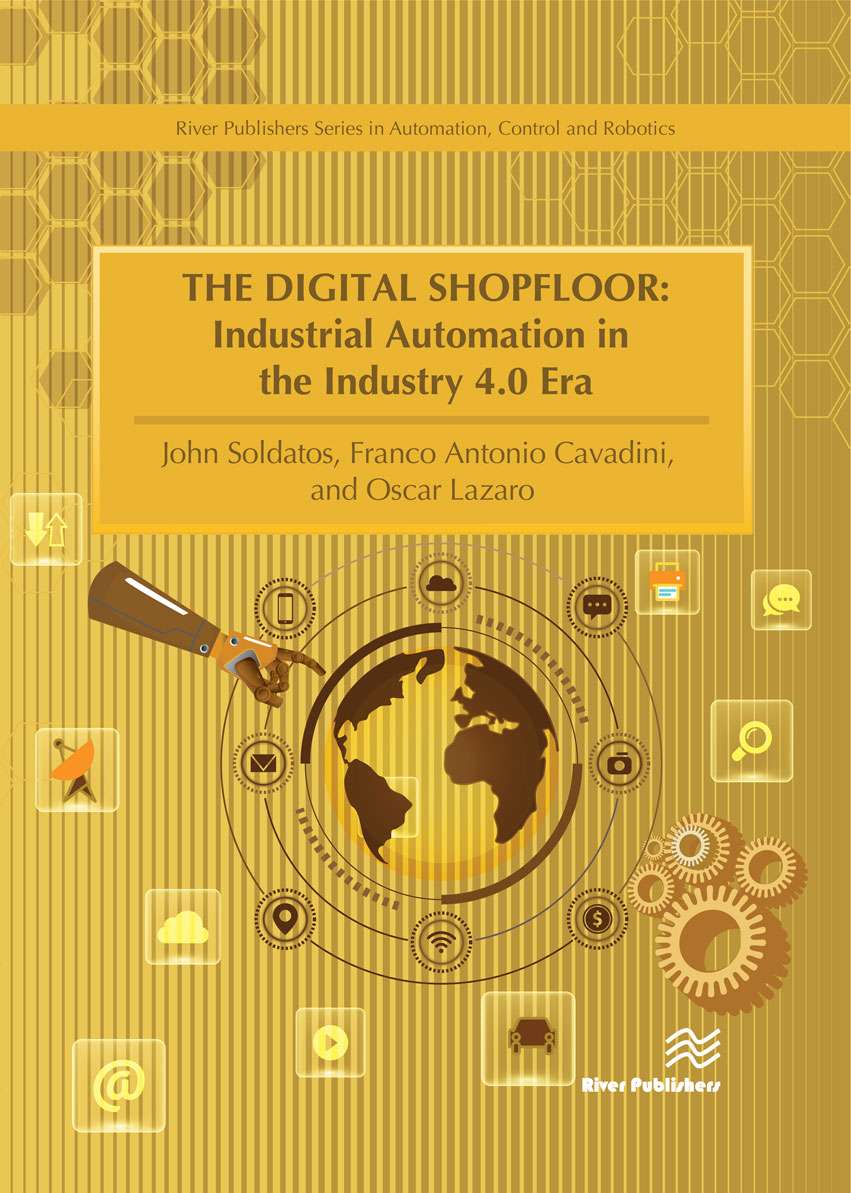
The Digital Shopfloor: Industrial Automation in the Industry 4.0 Era
Performance Analysis and Applications
Automation, Control and Robotics
The Digital Shopfloor: Industrial Automation in the Industry 4.0 Era
Performance Analysis and Applications
Editors:
John Soldatos, Athens Information Technology, Greece
Oscar Lazaro, Innovalia Association, Spain
Franco Cavadini, Synesis-Consortium, Italy
- Manufacturers' poor awareness about digital manufacturing solutions and their business value potential, as well as the lack of relevant internal CPPS/IIoT knowledge.
- The high costs that are associated with the deployment, maintenance and operation of CPPS systems in the manufacturing shopfloors, which are particularly challenging in the case of SME (Small Medium Enterprises) manufacturers that lack the equity capital needed to invest in Industry 4.0.
- The time needed to implement CPPS/IIoT and the lack of a smooth and proven migration path from existing OT solutions.
- The uncertainty over the business benefits and impacts of IIoT and CPPS technologies, including the lack of proven methods for the techno-economic evaluation of Industry 4.0 systems.
- Manufacturers' increased reliance on external integrators, consultants and vendors.
- The absence of a well-developed value chain needed to sustain the acceptance of these new technologies for digital automation.
Chapter 1: Introduction to Industry 4.0 and the Digital Shopfloor Vision
by John Soldatos
Chapter 2: Open Automation Framework for Cognitive Manufacturing
by Oscar Lazaro, Martijn Rooker, Begoña Laibarra, Anton Ružić,
Bojan Nemec and Aitor Gonzalez
Chapter 3: Reference Architecture for Factory Automation using Edge Computing and Blockchain Technologies
by Mauro Isaja
Chapter 4: IEC-61499 Distributed Automation for the Next Generation of Manufacturing Systems
by Franco A. Cavadini, Giuseppe Montalbano, Gernot Kollegger,
Horst Mayer and Valeriy Vytakin
Chapter 5: Communication and Data Management in Industry 4.0
by Maria del Carmen Lucas-Estañ, Theofanis P. Raptis,
Miguel Sepulcre, Andrea Passarella, Javier Gozalvez
and Marco Conti
Chapter 6: A Framework for Flexible and Programmable Data Analytics in Industrial Environments
by Nikos Kefalakis, Aikaterini Roukounaki,
John Soldatos and Mauro Isaja
Chapter 7: Model Predictive Control in Discrete Manufacturing Shopfloors
by Alessandro Brusaferri, Giacomo Pallucca, Franco A. Cavadini,
Giuseppe Montalbano and Dario Piga
Chapter 8: Modular Human–Robot Applications in the Digital Shopfloor Based on IEC-61499
by Franco A. Cavadini and Paolo Pedrazzoli
Chapter 9: Digital Models for Industrial Automation Platforms
by Nikos Kefalakis, Aikaterini Roukounaki and John Soldatos
Chapter 10: Open Semantic Meta-model as a Cornerstone for the Design and Simulation of CPS-based Factories
by JanWehrstedt, Diego Rovere, Paolo Pedrazzoli, Giovanni dal Maso,
Torben Meyer, Veronika Brandstetter, Michele Ciavotta,
Marco Macchi and Elisa Negri
Chapter 11: A Centralized Support Infrastructure (CSI) to Manage CPS Digital Twin, towards the Synchronization between CPS Deployed on the Shopfloor and Their Digital Representation
by Diego Rovere, Paolo Pedrazzoli, Giovanni dal Maso,
Marino Alge and Michele Ciavotta
Chapter 12: Building an Automation Software Ecosystem on the Top of IEC 61499
by Andrea Barni, Elias Montini, Giuseppe Landolfi,
Marzio Sorlini and Silvia Menato
Chapter 13: Migration Strategies towards the Digital Manufacturing Automation
by Ambra Calà, Filippo Boschi, Paola Maria Fantini, Arndt Arndt Lüder,
Marco Taisch and Jürgen Elger
Chapter 14: Tools and Techniques for Digital Automation Solutions Certification
by Batzi Uribarri, Lara González, Begoña Laibarra and Oscar Lazaro
Chapter 15: Ecosystems for Digital Automation Solutions an Overview and the Edge4Industry Approach
by John Soldatos, John Kaldis, Tiago Teixeira, Volkan Gezer and Pedro Malo
Chapter 16: Epilogue